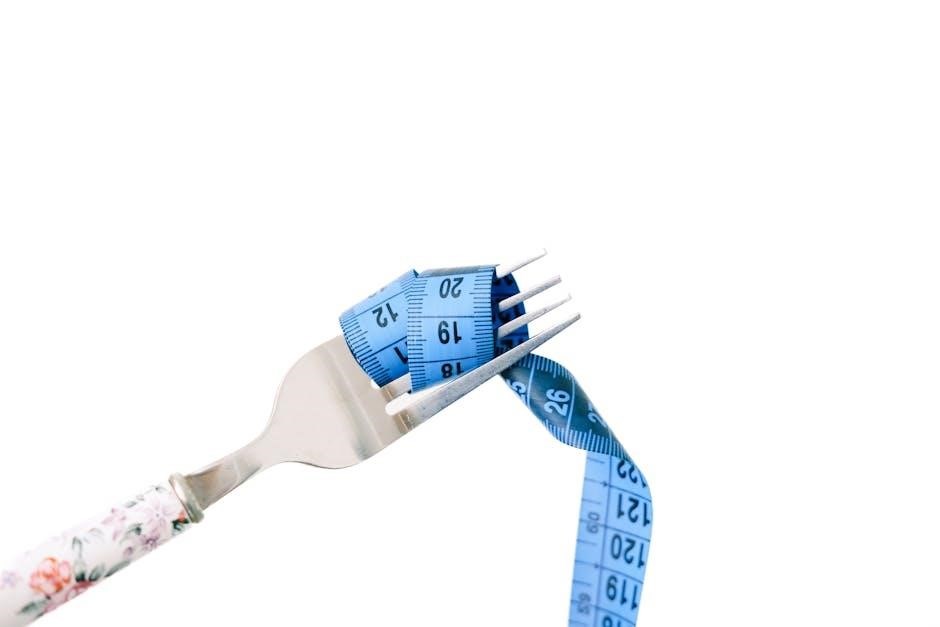A safe and nutritious diet plan designed for breastfeeding mothers to lose weight gradually while maintaining milk supply․ Focuses on balanced nutrition, hydration, and sustainable weight loss strategies․
Understanding the Importance of Nutrition for Breastfeeding Mothers
Nutrition plays a vital role in supporting milk production, maternal health, and baby growth․ A well-balanced diet ensures optimal energy levels and nutrient-rich breastmilk for the infant․
Key Nutrients for Milk Production and Weight Loss
Essential nutrients for breastfeeding include protein, healthy fats, and complex carbs to support milk production and energy․ Vitamins D, B, and minerals like calcium and iron are crucial; Omega-3 fatty acids, particularly DHA, promote baby’s brain development․ These nutrients also aid in sustainable weight loss by maintaining metabolism and satiety, ensuring a balanced diet that supports both mother and child․
Caloric Needs and Energy Balance
Breastfeeding increases calorie needs, with most mothers requiring 300-500 extra calories daily to support milk production․ Energy balance is crucial, as the body uses stored fat for milk synthesis․ Aiming for a deficit of 500 calories per day can promote gradual weight loss without compromising milk supply․ Ensure calorie intake aligns with activity levels to maintain energy and support both maternal health and baby’s growth․
Hydration and Its Role in Weight Loss and Milk Supply
Staying hydrated is essential for breastfeeding mothers, supporting milk production and aiding in weight loss by boosting metabolism and calorie burning naturally․
Recommended Fluid Intake for Breastfeeding Mothers
Breastfeeding mothers should drink 8-10 glasses of fluids daily, increasing in hot climates or with high activity․ Water, herbal teas, and milk are ideal․ Avoid sugary drinks and alcohol, as they hinder weight loss and milk quality․ Proper hydration supports milk production, boosts metabolism, and aids in calorie burning, making it essential for both weight loss and maintaining a healthy milk supply․

Best Fluids to Consume While Breastfeeding
Water is the best fluid for breastfeeding mothers, followed by herbal teas and low-sugar juices․ Coconut water and milk can support hydration and nutrition․ Avoid sugary drinks and alcohol, as they can affect milk quality and hinder weight loss․ Staying hydrated with these fluids ensures optimal milk production and supports a healthy metabolism, aiding in sustainable weight loss while breastfeeding․
Balanced Diet for Weight Loss While Breastfeeding
A balanced diet rich in nutrients supports milk production and aids in weight loss․ Focus on whole foods, lean proteins, and healthy fats to maintain energy and overall health․
Protein Sources for Milk Production and Weight Management
Protein is essential for milk production and weight management․ Include lean proteins like chicken, fish, eggs, and dairy․ Plant-based options such as legumes, beans, and nuts also support lactation․ Protein helps maintain muscle mass and boosts metabolism, aiding in weight loss while keeping breastmilk nutritious and plentiful for your baby․
Healthy Fats and Carbohydrates for Sustainable Energy
Include healthy fats like avocados, nuts, and olive oil to support milk production and energy․ Whole grains, fruits, and vegetables provide complex carbohydrates for sustained energy․ These nutrients help maintain milk quality and support the baby’s growth while aiding in gradual weight loss and overall health for breastfeeding mothers․

Exercise and Physical Activity for Weight Loss
Gentle exercises like walking or swimming can support weight loss without affecting milk supply․ Physical activity helps burn calories and maintains overall health for breastfeeding mothers․
Safe Postnatal Exercises for Breastfeeding Mothers
Gentle exercises like walking, swimming, and yoga are ideal for breastfeeding mothers․ These activities promote weight loss without straining the body․ Postnatal exercises should focus on core strength and flexibility to support recovery․ Kegel exercises and pelvic floor workouts are also beneficial․ Always consult a healthcare provider before starting any new routine to ensure safety and avoid impacting milk supply․
How Exercise Supports Weight Loss Without Affecting Milk Supply
Exercise helps burn fat while preserving milk production․ Moderate-intensity activities like walking or yoga support weight loss without depleting energy reserves․ The body uses stored fat for milk production and energy, ensuring milk supply remains stable․ Avoid extreme workouts, as they may reduce milk supply․ Consistent, balanced exercise paired with proper nutrition maintains both weight loss and milk production effectively․

Foods to Avoid While Breastfeeding and Trying to Lose Weight
Limit high-sugar, high-fat, and processed foods to support weight loss and milk quality․ Avoid excessive caffeine and alcohol, and opt for nutrient-rich, whole foods instead․
High-Sugar and High-Fat Foods to Limit
High-sugar and high-fat foods can hinder weight loss and may negatively impact milk quality․ Limit sugary snacks, fried foods, and processed pastries․ These foods often lack nutrients and can cause energy fluctuations․ Opt for natural sugars from fruits and healthy fats from sources like avocados and nuts․ Reducing these foods helps maintain a balanced diet, supports weight loss, and ensures optimal milk production for your baby․
Processed Foods and Their Impact on Weight Loss
Processed foods, such as packaged snacks, frozen meals, and sugary drinks, are high in calories, added sugars, and unhealthy fats․ These foods can hinder weight loss efforts and provide little nutritional value for breastfeeding mothers․ They may also negatively impact milk quality and overall health․ Limiting processed foods and opting for whole, nutrient-dense foods supports sustainable weight loss and maintains healthy milk production for your baby․
Gradual Weight Loss Tips for Breastfeeding Mothers
Focus on steady, sustainable weight loss through balanced nutrition and moderate exercise․ Prioritize nutrient-rich meals and stay hydrated to support milk production without compromising health․

Safe Rate of Weight Loss Per Week
A safe rate of weight loss for breastfeeding mothers is approximately one pound per week, ensuring milk supply remains unaffected․ This gradual approach supports overall health and prevents extreme calorie deficits․ Focus on nutrient-rich meals, adequate hydration, and moderate physical activity to achieve sustainable weight loss without compromising lactation․
Monitoring Progress Without Compromising Milk Supply
Regularly track weight loss progress through weekly weigh-ins and body measurements․ Monitor milk supply by observing baby’s feeding patterns and output․ Ensure gradual weight loss (1 pound/week) to avoid impacting milk production․ Pay attention to signs like fatigue or decreased milk supply, adjusting diet or consulting a healthcare provider if needed․ Prioritize nutrient-dense meals and hydration to support both weight loss and lactation effectively․

Sample Meal Plan for Breastfeeding Mothers
A structured meal plan providing balanced nutrition for breastfeeding mothers, including protein, whole grains, fruits, and vegetables․ Includes breakfast, lunch, dinner, snacks, and hydration tips for optimal health․
Breakfast, Snacks, Lunch, Dinner, and Dessert Ideas
Start with oatmeal topped with berries and nuts for breakfast․ Snack on Greek yogurt with honey or fresh fruits․ Lunch can include grilled chicken salads or whole-grain wraps․ Dinner ideas feature lean proteins like fish or turkey with steamed vegetables․ For desserts, opt for fruit smoothies or dark chocolate․ Stay hydrated with water, herbal teas, and milk to support milk production and overall health․
Grocery List for Healthy and Nutritious Meals
Incorporate lean proteins like chicken, fish, eggs, and legumes․ Include healthy fats such as avocados, nuts, seeds, and olive oil․ Stock whole grains like oats, quinoa, and brown rice․ Add plenty of fruits and vegetables for vitamins and fiber․ Dairy products like milk and yogurt are essential․ Don’t forget herbs, spices, and low-sugar snacks․ Stay hydrated with water and herbal teas, avoiding sugary drinks․ This list supports weight loss and milk production effectively․

Frequently Asked Questions About Diet and Breastfeeding
Common questions include how diet affects milk supply, safe weight loss rates, and managing hunger․ Answers focus on balanced nutrition and maintaining health for both mother and baby․
Does Weight Loss Affect Milk Supply?
Gradual weight loss typically does not affect milk supply if nutrition and calorie needs are met․ Extreme diets or rapid weight loss can potentially reduce milk production․ Breastfeeding mothers should focus on balanced meals and avoid restrictive eating to ensure adequate energy for milk synthesis․ Consult a healthcare provider for personalized advice on safe weight loss while breastfeeding․
How to Manage Hunger While Breastfeeding
Breastfeeding increases hunger due to higher calorie needs․ Eat nutrient-dense meals, including protein-rich and high-fiber foods, to keep you full longer․ Incorporate healthy snacks like fruits, nuts, and yogurt․ Stay hydrated, as thirst can sometimes mimic hunger․ Plan balanced meals and avoid extreme calorie restriction to maintain energy levels and milk supply․ Prioritize whole, unprocessed foods to support overall health and satisfaction․
This plan helps breastfeeding mothers achieve a healthy weight while maintaining milk supply․ For sustained success, explore additional resources and support tailored to your journey․
Final Tips for Successful Weight Loss While Breastfeeding
Focus on gradual weight loss, balancing nutrition with milk supply needs․ Prioritize whole foods, stay hydrated, and avoid extreme diets․ Incorporate gentle exercises and monitor progress weekly․ Ensure adequate calorie intake to support breastfeeding while creating a deficit for weight loss․ Consult a healthcare professional or nutritionist for personalized advice․ Track meals and physical activity to maintain consistency and motivation throughout your journey․
Resources for Further Support and Guidance
Downloadable PDF guides offer structured meal plans and expert advice for breastfeeding mothers aiming to lose weight․ Online communities and forums provide shared experiences and tips․ Consulting a registered dietitian or lactation consultant ensures personalized guidance․ Utilize reputable websites and apps for tracking nutrition and progress․ These resources help maintain a healthy balance between weight loss and milk production, ensuring both mother and baby thrive․
